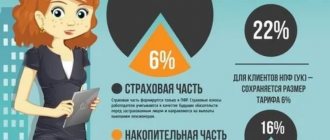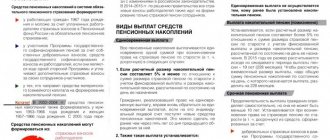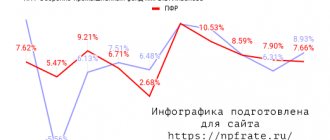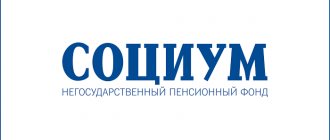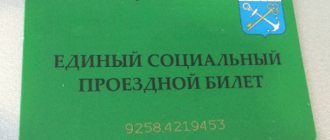Is the funded part of the deceased’s pension an inheritance?
Since 2002, pension provision in Russia has included three components:
- basic;
- insurance;
- cumulative.
Only a third of them are allowed to inherit, and then only if a number of the following conditions are met:
- The deceased individual was a participant in compulsory pension insurance and his account was replenished.
- The death of the testator occurred before the pension payments were issued.
- If the deceased has reached retirement age, but did not apply for payments and never received them.
Thus, the key point is to receive a pension for the deceased at least once. If this happens, then the legal successors will not be able to receive the accumulated portion.
Succession of pension savings after the death of father or mother
Inheritance of property, including pension savings, is carried out in two legal ways:
- in accordance with the last will of the person;
- within the law.
In the absence of a testamentary order, the transfer of property preferences is carried out according to law. In this case, the legal successors are exclusively close relatives of the deceased. Among the priority heirs are children.
Recipients of the inheritance are obliged to independently submit an application to the Pension Fund for receipt of payment. No employee is required to notify potential assignees of the availability of the opportunity to receive.
So, after the death of their father or mother, children have the right to apply to an authorized institution and enter into an inheritance. All accumulated funds will be distributed among applicants in equal shares. Moreover, it should be mentioned that both the natural children of the deceased and those adopted by him have equal opportunities.
An interesting situation arises with the participation of maternity capital funds in the mother’s savings. The following have the prerogative to receive:
- The children's father, who survived his wife. He is considered the primary and prevailing subject.
- If there is no father, then children who have not reached the age of majority or who have already celebrated their 18th birthday but are studying on a full-time basis are allowed to use the funds.
What happens after the death of the owner of the savings?
Money accrued for the entire period of validity of the accumulative part agreement can be transferred by the relatives of the account owner (for details about who will receive the accumulative part of the deceased’s pension and what the terms of payment are, read this article). What does the law say about this?
- According to Art. 1183 of the Civil Code of the Russian Federation, unpaid amounts as a result of death (salaries, pensions, benefits, etc., provided to a person as a means of subsistence, can be inherited by family members (read more about the features of inheriting the funded part of the deceased’s pension here).
- In accordance with Art. 2 Federal Law No. 360, several options for paying out the funded portion are possible. In addition to the one-time, fixed-term and lifelong pensions that are provided for the owner of this pension, the law also establishes payments to the owner’s successors.
The deceased’s pension can be received by other persons if:
- during his lifetime, the account holder applied for a lump sum payment, but in fact did not receive it;
- he has not reached retirement age;
- an urgent payment was made - in this case, the heirs will receive the remaining portion (how to receive the funded part of the pension of a deceased person?).
The rules and procedure for payments are described in Government Decree No. 711 of July 30, 2014. According to the law, the funded part can be transferred to legal successors on two grounds:
- in law;
- upon application.
If the owner of the accruals left a statement in the Pension Fund, which stores his savings, about the distribution of his funds to specific individuals, then it is these citizens who will inherit the money.
In the absence of an application, the money is inherited in order of priority. The first stage includes:
- parents;
- spouses (we talked about when and how to receive the funded part of the pension after the death of the husband in a separate article);
- children.
To the second:
- brothers;
- sisters;
- grandmothers;
- grandfathers;
- grandchildren.
IMPORTANT! According to clause 4, PP No. 711, the funded pension formed from maternity capital funds goes to the spouse or minor children.
The order of succession is as follows:
- money is distributed among priority family members in equal shares;
- relatives of the next priority can receive accruals only if the deceased does not have a first-degree family member.

What will happen to the funded part if the deceased did not have legal successors? In this case, the accumulated funds will be considered escheatable property and, in accordance with Art. 1151 of the Civil Code of the Russian Federation will become the property of the state. In ch. 4 of PP No. 711 specifies that in the absence of a deceased relative or in the event of refusal of inheritance, the money is transferred to the reserve of the compulsory insurance fund.
Registration of inheritance for labor pension
If the person who has left the world has never received a pension, then relatives have the preference to receive the accumulated funds in a personal pension account.
To apply, applicants must contact the nearest branch of the Pension Fund of Russia, write an application indicating their desire, and attach the prescribed package of documents to it.
Where do pension savings go after a person dies?
The fate of the pension savings of a person who has passed on to another world is determined by several factors:
- if an individual began to use pension benefits during his lifetime, then the balance of the funds stored in his account after his death will remain at the disposal of the Pension Fund or a non-state fund. That is, the heirs in this case will not receive anything and have no right to claim;
- compliance with delivery deadlines. If the application deadlines are met, the payment will be received by the legal successors. If there are no valid reasons for restoring the registration period, then the accumulative part will remain in the assets of the fund.
How is payment inherited to legal successors?
When inheriting by will, fund employees initially notify individuals of the existence of such a preference.
Further, the procedure becomes the same in both testamentary disposition and inheritance by law. Persons who have a preference for receiving financial assets apply to the authorized institution within six months after the death of the account owner. A list of documents is attached to the application.
How does the Pension Fund work?
Few people think about the fact that, in essence, the work of the Pension Fund resembles the work of an insurance company. After all, many of us take out different insurance packages, regularly pay insurance premiums, but no one can know whether an insured event will occur or not.
Pretty much the same thing happens here. A person pays pension contributions, but cannot be sure in advance whether an “insured event” will occur, that is, whether he will retire or whether he will live to see it. Everyone has their own time limit, and it is impossible to predict the date of death.
Of course, many people have a question: where do pension savings disappear, since we are talking about very impressive amounts? The answer here is simple - they don’t disappear anywhere. If a person passed away too early and did not have time to exercise the right to receive a pension, or received payments for only a short time, then a significant amount remains in his accounts, which... close relatives can receive. However, few people use this right. And in this case, the money goes to the state.
How to bequeath the funded part of a pension
If you want to dispose of the accumulated funds in the Pension Fund, then it is better to formalize the order at the branch itself. The owner visits the institution and, in an agreement or a separate statement, indicates the persons who have the right, after his death, to claim receipt, as well as the distribution of shares or without it.
First line of kinship, inheritance of spouse
In the absence of a will, they are involved in inheritance according to the law. There is a certain order of receipt. So, the first-line successors include:
- children of the deceased;
- spouse (in a registered marriage);
- parents or adoptive parents.
The listed persons inherit in the prevailing order. If there are no representatives of this queue, then the second queue inherits and so on.
Redistribution of funds within one queue occurs in equal parts.
The surviving spouse has the exclusive right to inherit the funded portion formed from maternal capital funds. And only in his absence do the children have the right to take the money. And if it turns out that there are neither one nor the other, then the funds are returned to the Pension Fund.
After the death of the father, who is paid?
If the father left an order, then only the individuals recorded in it will receive it.
If no instructions are given, then payments will be made according to the law within the framework of priority. The children, spouse and parents of the deceased head of the family have a privileged position.
Distant relatives
Current legislation states that the prerogative of registering and receiving the accumulated funds of the deceased belongs exclusively to the heirs of the first and second priority:
- children;
- spouse;
- parents;
- brothers and sisters of the deceased;
- grandparents and grandchildren.
Mandatory share in the inheritance for a disabled person
A disabled individual has the right to claim a compulsory share of the pension savings of the deceased if:
- He was completely dependent on the deceased until his death.
- The parents or grandparents of the deceased are pensioners or persons unable to work for whom no one else can provide.
- Minor children, brothers and sisters, grandchildren who have become disabled. Also if, according to the law, there is no one to provide them. For example, upon the death of a grandfather, a disabled grandson who has parents does not have the right to claim a compulsory share.
Receiving an inheritance by law and by will - differences
The table illustrates the existing differences in the forms of receiving inheritance:
| In law | By testamentary disposition |
| Heirs of the first and second stages are involved (only close relatives) | Any specified person, including a complete stranger, can act as a successor |
| When submitting documentation, you must prove the presence of family ties | No proof of relationship required |
| Funds are distributed in equal parts | If there are several applicants at your disposal, you can indicate the shares of each. In the absence of information, distribution is carried out in an equal amount |
How to receive the insurance part of a pension after the death of a pensioner
According to clause 1, part 1, article 25 of Federal Law No. 400 “On Insurance Pensions,” the Pension Fund of the Russian Federation cancels the payment of the insurance pension and additional payments to it from the 1st day of the month following the date of death of the user. So, if a pensioner died on October 9, 2017, then the termination of insurance pension payments will be dated November 1, 2017.
The accrued amounts of the insurance pension that were due to the pensioner and were not paid to him will be transferred to family members who, at the time of death, were constantly living with the pensioner. Article 26 of the Federal Law-400 provides a complete list of persons who may qualify for payment:
- at the time of death they were constantly living with the pensioner;
- family members recognized as disabled;
- users who applied for the unreceived amount of pension no later than before the expiration of 6 months from the date of death of a relative.
If several citizens apply for an insurance pension, the payment amount will be distributed among them in equal proportions.
As for such a process as inheriting the insurance part of a pension, this is impossible.
Procedure for inheriting the insurance portion of a pension
the insurance part of the pension , therefore no one can claim to receive it.
The only payment that will be available to relatives is the unpaid pension of the deceased, as well as additional payments to it.
However, if the deceased was dependent on a disabled close relative, for whom the only source of income was the financial support of the deceased, then there is the option of applying for a survivor’s pension.
Who is entitled to the accumulative payment of the insured person's funds?
According to the law, only the closest relatives of the deceased person, as well as disabled individuals who are fully supported by him, have the right to inherit. Distant relatives do not have the prerogative of inheritance. If there is an order, then all the persons recorded in it.
Returning the pension savings of the deceased - is this an inheritance?
It is possible to receive the pension savings of the deceased using the standard inheritance procedure. That is, any return of funds to legitimate applicants will be considered succession, since the same time period is determined for the appeal as for inheritance, and the circle of recipients is also limited.
General information
Since 2020, the formation of insurance pensions for working citizens has been carried out. There are insurance pensions for disability, old age and loss of a breadwinner. Payments can be urgent, one-time or for a specific purpose.
The amount and the right to own it are formed in accordance with the accumulated points.
Important! A citizen has the right to receive an old-age pension if the following conditions are met:
- if a citizen has reached 60 years of age (or a citizen has reached 55 years of age), this age has been reduced for certain categories of citizens;
- insurance experience is at least 15 years;
- accumulated 30 or more points.
Each year worked by a citizen entails the formation of pension rights in the form of special points. Their number depends on the type of pension provision.
If only the insurance part of the pension is formed, then 10 points are awarded, but if the funded part of the pension is also formed, then 6.25 points are awarded.
The employer pays contributions to the Pension Fund for each employee at a 22% rate. At the same time, the employee himself has the right to choose what exactly the funds will be used for.
For example, all contributions will form the insurance part of the pension, or 6% will be used to form the insurance part of the pension, and 16% will form the funded one. It should be noted that only citizens born after 1966 have the right to make such a choice.
Attention! Our qualified lawyers will assist you free of charge and around the clock on any issues. Find out more here.
You can entrust the formation of your pension to:
- Pension Fund (in this case it is necessary to select a management company);
- non-state pension fund.
The fund you choose will account for and pay out funds.
You have the right to obtain information about your pension savings using your SNILS number as follows:
- when visiting a Sberbank branch in person;
- in the Internet;
- by postal notice;
- Having received an extract from your personal account.
In December 2014, the President of the Russian Federation signed a decree according to which the moratorium on pension savings was extended.
This means that all contributions made in 2020 and later will be used to form an insurance pension. There is no information about further lifting of the moratorium yet.
How can heirs receive pension savings for a deceased relative?
With any form of succession, applicants will have to carry out all their actions through the Pension Fund. Initially, an expression of will to receive is carried out, paper support is supported, employees check the information provided and a decision is made to assign payments or refuse them.
How to find out the amount of inheritance after the death of a relative
The amount of accumulated funds after death can be determined in several ways:
- Online on the websites of government services and the Pension Fund. To do this, registration and the SNILS number of the deceased citizen are required.
- When contacting the fund in person. You need to have with you an identity card, a relative’s insurance certificate, and a document allowing you to apply for such information.
- If the deceased participates in the savings of a non-state fund from Sberbank, all the information of interest can be found through an ATM or the official domain, by personally visiting the office.
The necessary conditions
The account acts as a hereditary estate in the event that there are transfers to it during life and the owner has never received a pension. Disabled persons, former dependents, as well as close relatives of the individual have the right to apply for payments. Any persons specified in the last expression of the individual’s will have the right to receive funds.
How exactly and where is it paid?
The application submitted by applicants is subject to consideration within six months. In a non-governmental institution, the procedure is faster, from 20 to 40 days. If a positive decision is made, funds are transferred in two ways:
- to the specified bank account. All information is provided by the heir himself when writing the application;
- by post. If the applicant does not have an account or has not indicated one, then the funds are transferred by mail. Payment for the transfer is made by the recipient.
Documents for receiving the funded part of the deceased’s pension
The application will be accepted if the following paper support is provided:
- Certificate of death of an individual (if the applicant is a relative).
- Confirmation of relationship (document on marriage, birth, adoption).
- SNILS of the deceased.
- Personal account details for transfer.
For a non-relative indicated in the agreement by the testator, only an application for consent to receive funds and information about a bank account for deductions will be required.
Payment deadline and receipt of money
It is necessary to apply to the fund within a specified period, no later than 6 months from the date of death of the individual.
Write an application and attach documents. Employees will also check the provided data within six months and transfer funds to the applicant’s specified personal account or send by mail. You can receive finance upon presentation of your passport.
Drawing up a statement after the death of a husband or father
There is no specifically established strict application form. You can fill it out yourself and send it to the Pension Fund or write it to the department using the sample. However, there are points that should be reflected in the appeal:
- personal information of the applicant;
- relation degree;
- details of the deceased, date of death;
- information about the dependents of the deceased person;
- information about the applicant’s income, including benefits and pension;
- a list of documents attached to the petition.
How much does it cost to register an inheritance with a notary?
The total cost of registration consists of:
- Payment of state fees (for performing notarial acts and the price of the certificate form).
- 0.3% of the total value of the resulting inheritance for close relatives, for all others - 0.6%.
On average, the price reaches 20 thousand rubles.
How can you challenge a will and get your money back?
You can challenge the will in court, and then the money from the funded part of the pension will be returned to the rightful claimant. However, to challenge it, you will need to prove one of the grounds for the invalidity of the testamentary disposition:
- incorrect content of the document;
- the order was drawn up in a state of insanity;
- the presence of senile dementia in the testator;
- other factors.
Registration procedure
Currently, the entire procedure for applying for and receiving the funded part of pension provision is regulated by Decree of the Government of the Russian Federation No. 471 of November 2011.
The algorithm is as follows:
- Collection of the necessary list of documents.
- Contacting the authorized body.
- Submission of documents.
- Waiting for a decision to be made.
- Receiving payment.
Where to contact?
Applicants for receiving this payment will have to contact the territorial department of the Pension Fund in the office.
submit documents in the following ways:
- by personal contact;
- with the help of a trusted person;
- postal delivery. In this case, it will be necessary to send by registered mail with an inventory.
Application deadlines
According to the laws of the Russian Federation, you can receive the funded part of the pension within the first 6 months from the moment its owner passes away.
When is it paid?
After a positive decision has been made to provide the pension savings of the deceased, payment is made no later than the 15th day of the following month after the required package of documents was submitted.
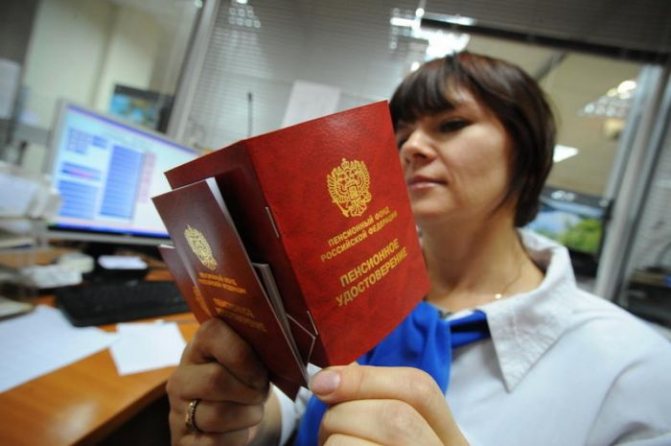
When to make a decision on extradition or refusal
After submitting the required package of documents, the decision by the Pension Fund employees is made within 5 calendar days .
Grounds for refusal
The key factors that can negatively affect a positive decision are considered to be:
- the package of documents was not provided in full;
- errors when drawing up an application;
- lack of grounds for receiving.
How to make an application
Download the application form for receiving the pension savings of the deceased.
When drawing up an application, you must remember that the presence of any typos or blots in it is unacceptable. If this is the case, the refusal can be received instantly.
The application is drawn up in the prescribed form, which must contain the following information :
- Full name of the applicant;
- relation degree;
- passport information;
- reasons for receiving payment;
- bank details for transferring a sum of money;
- residential address;
- date of birth;
- number and signature of the applicant.
Withdrawing money from the deceased's account for a funeral by inheritance
In Russia, support measures are provided upon the death of a relative, namely a social benefit for burial. It is paid to the Pension Fund upon the application of loved ones of the deceased. Payment is made immediately, on the day of application, based on the death certificate. It is allowed to receive money no later than 6 months after the death of the pensioner.
To apply you must provide:
- Identification.
- Appeal.
- Certificate of death.
- Confirmation of the fact that the pensioner was unemployed on the day of death.
Who can receive savings
In order to avoid disputes regarding persons applying for a pension of the deceased and their rights, it is advisable to refer to the provisions of Article 1183 of the Civil Code of the Russian Federation.
The code contains a list of citizens who have the right to receive the pension of the deceased:
- spouse of the deceased;
- disabled dependents, disabled people who were supported by a deceased citizen, it does not matter whether they lived with him or not;
- close relatives who lived with the deceased.
These persons have the opportunity to receive for a citizen the unpaid part of his pension after his death.
Remember! If we specify these categories of citizens, we can distinguish the following persons:
- close relatives along vertical and horizontal lines of kinship who have not reached the age of 18;
- students of higher educational institutions who have not reached 23 years of age and were dependent on the deceased;
- disabled persons, as well as disabled people who were supported by a pensioner;
- disabled parents of a pensioner who were fully supported by him;
- the spouse of the deceased who has reached retirement age or is disabled receives a pension;
- close relatives of the pensioner who do not work were dependent on the deceased citizen;
- citizens who are guardians of the children of a deceased pensioner (both natural and adopted) under the age of 14. It is necessary for guardians to provide for and raise the pensioner’s children.
The nuances of receiving a pension that was not paid in the month of death of a relative
Death can overtake a person at any time. It often happens that a pensioner does not have time to receive his pension in the current month. If the recipient dies, then his close relatives have the right to receive for him upon application to the Pension Fund.
If the pension was paid to a card at Sberbank, then it makes no sense to contact the Pension Fund. The account has already been created, and this means that the pension has been paid. Then the amount is included in the inheritance estate.
Many people mistakenly believe that they have the right to claim a pension in two months. But that's not true. Payment is made for one last month.
The funded part of the pension can act as an inheritance both by testamentary disposition and by law. The will in this case is not entirely standard and is drawn up in an agreement with the foundation or indicated in a separate application at the authorized institution itself.
It is possible to take advantage of the prerogative if the deceased has never received a pension payment during his lifetime, was born before 1967, and generally had contributions and funds in his account.
How to receive a funded pension?
To do this, you need to start an inheritance case and contact a notary - he must open the case in accordance with the Federal Law “On Labor Pensions” of the Russian Federation. To receive the funded part of the pension related to the inheritance, you need to contact the Pension Fund.
In addition to the same documents that were listed in the list above, you must also have on hand:
- certificate of family composition
- certificate of inheritance
After the procedure for reviewing the documents you provided is completed, the approved amount of money from the funded part of the pension will be transferred to the applicant’s account every month.
It also makes sense to contact a notary if the pension was transferred to a savings book. Then, in addition to the documents listed at the beginning of the article, you must have an inventory of the inheritance (it must reflect the entire amount of money in the deceased’s savings book).
Since this issue again turns out to be in the field of inheritance law, you will have to wait 6 months from the moment the case was opened. At the end of this temporary period, you are issued an inheritance certificate, along with which all the financial assets of the deceased, including the funded part of the pension, become your property.
You might be interested:
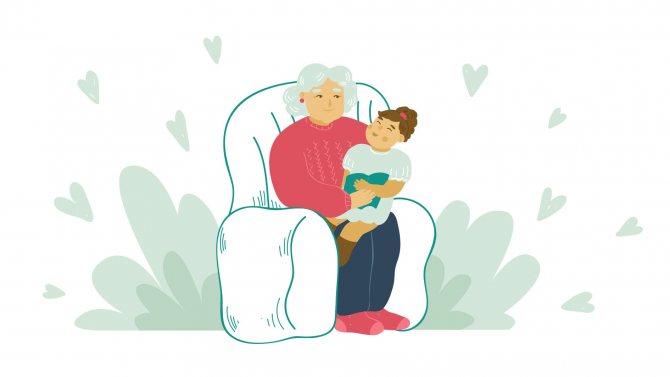
Although pension savings are formed in individual accounts of citizens, the ownership of these funds belongs to the state. And the state, as the owner, reserves the right to index them, “freeze” or limit investment.
A funded pension also cannot be inherited in the literal sense of the word. The law on inheritance does not apply to it, but the laws “On Labor Pensions in the Russian Federation” and “On Insurance Pensions” come into force.
